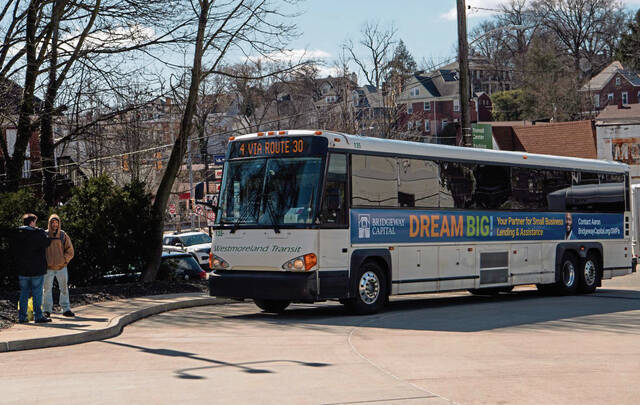https://development.triblive.com/local/westmoreland/westmoreland-transit-ends-connectcard-fare-system/
Westmoreland transit ends ConnectCard fare system

The Westmoreland County Transit Authority on Friday halted the use of the cashless ConnectCard fare system that had been in place on its fixed-route bus system since 2018.
Initially touted as customer service advancement that allowed bus riders to pay fares without having exact cash, the system never flourished, suffered from technical glitches and ultimately saw few users among passengers.
“It had issues from the day it started,” authority Deputy Executive Director Ashley Cooper-Brounce said. “Once we brought on the mobile app several years ago (ConnectCard) wasn’t used as much. Over the past 12 months only a handful of riders used ConnectCard.”
Riders can continue to pay fares through an online app for smartphones unveiled in 2019. Cash fares on buses and prepaid paper passes also are accepted on the buses.
Cooper-Brounce said 58% of bus fares were paid through the app last year. About 30% of fares were paid in cash and 12% of riders used paper tickets and prepaid passes.
ConnectCard was initially implemented by Pittsburgh Regional Transit and expanded to Westmoreland County’s bus system.
The authority in 2013 paid $558,000 to Massachusetts-based Scheidt & Bachmann USA for the cashless fare system. Delays in finalizing a working version of the equipment pushed back its launch for years.
The system was designed to allow riders to preload cash onto a plastic credit card that is swiped when entering a bus. Fares were drawn down from the accounts, which could be reloaded online, at the transit center in Greensburg and initially at six retail locations throughout the county.
The authority stopped selling and uploading funds onto ConnectCards at retail locations in 2019.
“It became tedious and expensive to fix the equipment on the buses,” authority Executive Director Alan Blahovec said.
Customers with cash remaining on existing ConnectCard accounts may contact the authority for refunds.
Ridership increase
The winding down of ConnectCard system comes as the authority continues to see small increases in ridership.
According to statistics released last week, more than 205,000 passengers rode authority buses over the past year, a 6.4% jump over the previous 12 months. Ridership, while rebounding, has remained far below levels from before the pandemic, when the authority saw more than 400,000 bus riders annually.
The authority operates 17 daily and seven weekend routes.
Officials this year announced a series of strategic shifts in services designed to increase ridership.
Changes include refining the authority’s service areas, adding additional routes and extending hours of operation. The authority pitched the launch of a new service modeled on popular ride-sharing ventures such as Uber and Lyft.
There are plans for the implementation of micro-transit zones, where passengers will be able to summon rides to specific locations through the use of an online application within a prescribed boundary.
A pilot program could be launched next year to serve customers in New Kensington, Arnold and Lower Burrell with a second travel zone set to serve the Irwin, North Huntingdon and Herminie areas in 2026.
Blahovec said consultants will assist the authority in planning to launch service upgrades for next year.
Copyright ©2026— Trib Total Media, LLC (TribLIVE.com)
